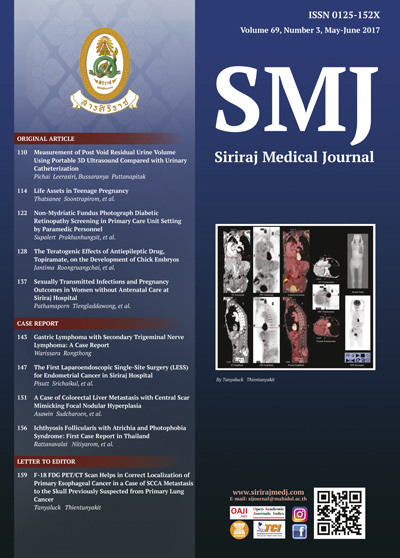The Teratogenic Effects of Antiepileptic Drug, Topiramate, on the Development of Chick Embryos
Keywords:
Topiramate, teratogen, chick embryoAbstract
Background: Anti-epileptic drugs are known to be the risk of teratogenicity. Topiramate (TPM) is a new kind of such drug, for which no research has confirmed the incidence of producing congenital abnormalities.
Objective: This study was conducted to study the teratogenic effects of TPM by using chick embryos as an animal model and the results can be compared to the human embryo of the same stage.
Methods: Fertilized Leghorn hen eggs were injected in ovo with two concentrations of TPM, which were 10mg, and 20mg, in NSS at a volume of 0.1 ml into the yolk sac at 21 hrs of incubation and repeated injections at 72 hrs at a volume of 0.05 ml. The chick embryos on day 3, 6 and 11 of incubation were sacrificed and all living embryos
were processed for total mount and serial section.
Results: The mortality rate increased corresponding to the concentrations of TPM, and the embryonic stage. The total mount of day 3 showed major abnormalities of the eye and heart, such as microphthalmia and looser of heart looping. The serial section of day 3 showed opening of the anterior neuropore, ectopia viscerae and multiple malformations of the eye and heart. Day 6 chick embryos showed ectopia cordis and ectopia viscerae. Moreover, there were retardation and abnormalities of several organs such as eye, heart, liver, mesonephros and gonads. Day
11 chick embryos showed ectopia viscerae and several growth retardations, retardation of ossification of both limb bones and skull bones.
Conclusion: This study showed that TPM might cause embryonic death, growth retardation and abnormalities of the eye, heart, an opening of the anterior neuropore and ectopia viscerae. This might indicate abnormalities to the baby born from mother with gestational epilepsy who was taking this drug continuously, and it might lead to
spontaneous abortion or congenital anomalies of the fetus.
Downloads
Published
How to Cite
Issue
Section
License
Authors who publish with this journal agree to the following conditions:
Copyright Transfer
In submitting a manuscript, the authors acknowledge that the work will become the copyrighted property of Siriraj Medical Journal upon publication.
License
Articles are licensed under a Creative Commons Attribution-NonCommercial-NoDerivatives 4.0 International License (CC BY-NC-ND 4.0). This license allows for the sharing of the work for non-commercial purposes with proper attribution to the authors and the journal. However, it does not permit modifications or the creation of derivative works.
Sharing and Access
Authors are encouraged to share their article on their personal or institutional websites and through other non-commercial platforms. Doing so can increase readership and citations.











